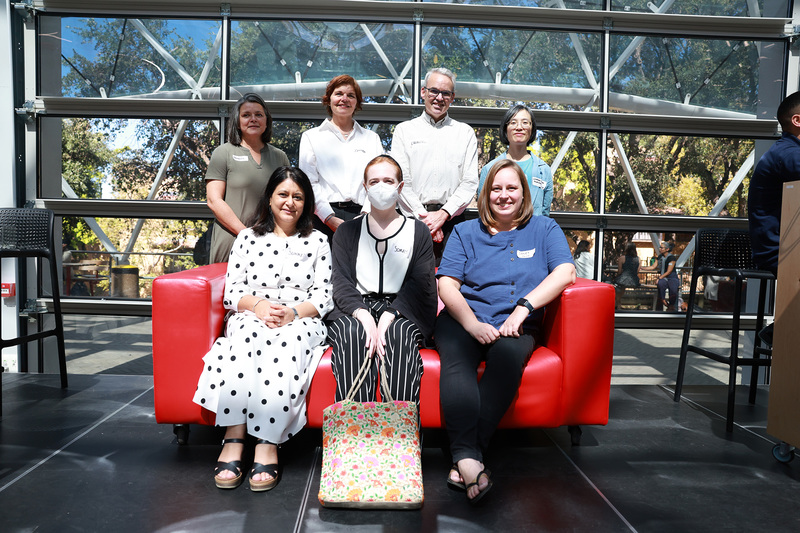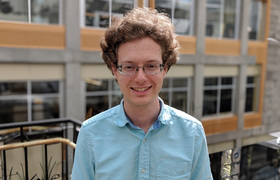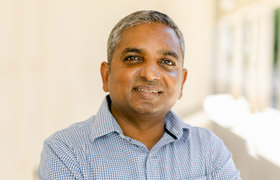Reimagining assessment in an AI future
20 June 2025 | Story Azraa Dawood. Photo Wandile Tonka. Read time 7 min.
When generative artificial intelligence (GenAI) tools first surged into the mainstream, higher education institutions faced an urgent question: how do we regulate or contain them within existing academic structures?
Two years into the conversation, there are some noticeable changes. At the recently held “Assessment in the Age of AI: Principles, Practices, and Innovations for the Future of Learning” symposium, delegates engaged with deeper questions around the nature of assessment in an AI-enabled world. The symposium was convened by the University of Cape Town’s (UCT) Centre for Innovation in Learning and Teaching (CILT) and Stellenbosch University’s (SU) Centre for Teaching and Learning.
Questions included:
- How do we reimagine assessment in ways that continue to centre learning, critical inquiry, and human agency?
- How can universities in South Africa collaborate to address the challenges and leverage the opportunities posed by GenAI?
A sector grappling with complexity
The symposium, supported by the University Capacity Development Grant, took place at a time when questions around academic integrity, assessment design, and the role of GenAI in higher education are becoming increasingly critical, not only across South Africa, but globally too. Attracting over 100 delegates and including participants from UCT, SU, the University of the Western Cape (UWC), the Cape Peninsula University of Technology (CPUT), and Rhodes University (RU), the range of abstracts showed the heightened interest in both practice-based and theoretical insights into better understanding AI’s impact on assessment.
As many of the delegates recognised, these developments are being met with deliberate and critical reflection, requiring system-wide approaches to assessment that demand frameworks and guidelines to shape practices. Rather than relying on AI text detection tools, which are unreliable, there is a conscious move towards reframing assessment practices to better align with authentic learning, critical thinking, and ethical engagement in an AI-mediated world.
Perspectives from the ground
Cross-institutional collaboration was evident throughout the symposium, with researchers and practitioners from multiple universities offering insights that moved beyond GenAI as a technical tool and into the domain of ethical, disciplinary, and pedagogical reflection.
The day started with a student panel comprising students from UCT and Stellenbosch University, providing valuable perspectives on how students are experiencing AI in their academic work and what they need from their institutions.
Associate Professor Daniela Gachago and Dr Cheng-Wen Huang from UCT showcased how GenAI could be intentionally integrated into assessment design through their short course, “Designing with AI: Assessment in an AI-Integrated Learning Environment”. Their presentation illustrated how AI can be framed as a “thinking partner” – embedded thoughtfully into reflective, collaborative, and evaluative learning processes rather than treated as an external threat to manage.
“Educators could embrace multi-modal, artistic engagements with texts, creating assessments that remain deeply human, personal, and resistant to replication by AI systems.”
In another powerful contribution, Dr Katia de la Cruz Garcia from UCT presented on transforming language and literature assessment through the Pre-Texts protocol. She argued that, rather than attempting to “AI-proof” assessments, educators could embrace multi-modal, artistic engagements with texts, creating assessments that remain deeply human, personal, and resistant to replication by AI systems.
Emma Swart from SU shared case studies demonstrating how AI is being integrated into assessment design. She emphasised the importance of pedagogical responsiveness, noting that AI isn’t replacing learning, it’s transforming it.
Neil Kramm from RU challenged the assumption that AI use is inherently dishonest. Instead, he advocated for trust-based assessment practices that build student agency and deepen disciplinary knowledge.
Melvin Pather and Zainab Gaffoor from UCT spoke to the ethical complexities of AI in fine art education, sharing the Michaelis School of Fine Art’s development of guidelines for responsible AI use. Their work underscored the importance of fostering creativity and critical engagement while maintaining human-centred artistic practice.
From reaction to redesign
The day’s discussions made it clear: universities are not simply reacting to AI’s challenges. Academics and teachers are actively working to reconceptualise assessment designs to enable critical thinking, creativity, disciplinary knowledge, and ethical engagement.
As part of this shift, lecturers across institutions are rethinking traditional models of assessment. In some cases, this has included a renewed emphasis on observable assessments such as orals, vivas, and in-person invigilated tasks, methods that foreground students’ ability to engage meaningfully with material or achieve tasks, beyond what generative AI tools can easily replicate.
This approach reflects the sector’s broader commitment: to ensure that AI becomes an enabler of deeper learning, rather than a threat to academic standards. At the same time, fundamental shifts in how universities, fields and disciplines envisage and offer assessment are on the horizon, as AI technologies not only improve in capabilities but are also appearing in many common software tools. So, the distinction between human-generated text and AI-generated text will become increasingly blurred.
Key themes for collaborative action
Themes that emerged during the symposium included:
- the integration of AI as a cognitive and collaborative partner in learning
- the protection and promotion of diverse epistemologies and creative expression
- the need to centre student agency and ethical responsibility in assessment design
- a commitment to equity and inclusion as AI becomes embedded in educational practices.
Ongoing commitment to cross-institutional learning
Director of CILT, Sukaina Walji, said, “Rather than viewing the symposium as a stand-alone event, CILT sees it as part of a broader, sustained engagement with how AI is reshaping the purposes and practices of higher education.”
Through building a community of practice, resource sharing, and critical scholarly work, South African universities are reflecting not just on how AI can fit into existing systems but how education itself must evolve to remain human-centred, ethical, and transformational in an increasingly GenAI-saturated world.
“Assessment in the age of AI is not about containment – it’s about co-creation, critical inquiry, and care.”
As Dr Hanelie Adendorff from SU reflected during the closing plenary: “Higher education promises transformation, care, and lifelong learning. But our current systems prioritise sorting, control, and performance.” AI, she warned, magnifies those tensions unless institutions in South Africa actively choose a different path.
The symposium demonstrated that when universities work together, sharing insights, challenges, and innovations, the conversation moves beyond institutional boundaries toward sector-wide transformation. This collaborative approach positions South African higher education to lead thoughtful, ethical integration of AI in assessment practices.
For a reflection on the symposium, listen to the podcast.
 This work is licensed under a Creative Commons Attribution-NoDerivatives 4.0 International License.
This work is licensed under a Creative Commons Attribution-NoDerivatives 4.0 International License.
Please view the republishing articles page for more information.










